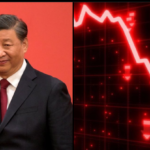Global Markets React to US Tariff Policies: A Report on Recent Developments
In recent weeks, the global financial landscape has been significantly impacted by the United States’ new tariff policies, which have triggered a chain reaction in international markets. The imposition of these tariffs has caused substantial volatility, with investors and analysts now closely monitoring the unfolding situation. Among the most notable reactions are Taiwan’s decision to offer zero tariffs to the U.S., the sharp decline in the Chinese stock market, and a significant drop in futures for major indices such as the Nasdaq-100, S&P 500, and Nikkei 225. This report explores the effects of these tariff policies on global markets and examines potential long-term consequences for the global economy.
Taiwan’s Response: A Strategic Move
Taiwan has taken a strategic step in response to the U.S. tariff policies by offering zero tariffs to American goods. This move is designed to foster stronger economic ties between Taiwan and the United States, providing a countermeasure to the tariff-related tensions between the U.S. and China. Taiwan’s decision could also be interpreted as an attempt to position itself as an alternative trading partner to China, particularly in the context of growing geopolitical tensions in the region. By eliminating tariffs, Taiwan aims to attract more American investment and bolster its trade relations, potentially making it a more attractive destination for businesses seeking to diversify their supply chains away from China.
While this gesture is likely to strengthen Taiwan’s position in the eyes of the U.S., it remains to be seen whether other nations will follow suit. The global trade environment is becoming increasingly polarized, with countries aligning themselves either in favor of or against U.S. trade policies, which could have long-term effects on global trade dynamics.
Chinese Market Decline: A Negative Signal
In stark contrast to Taiwan’s proactive approach, China’s stock market has reacted negatively to the U.S. tariff policies. On the first day of trading following the announcement, Chinese stocks plummeted by 10%, signaling a lack of investor confidence in the country’s economic outlook. The sharp decline is reflective of broader concerns over the potential for a protracted trade war between the U.S. and China, which could lead to reduced exports, disrupted supply chains, and slower economic growth for China.
China’s economic growth, which has been a key driver of the global economy for the past few decades, is heavily reliant on international trade. Any tariffs or trade restrictions imposed by the U.S. threaten to undermine China’s position as the world’s second-largest economy. As a result, the Chinese government may be forced to adopt countermeasures to stabilize its economy, including currency devaluation, stimulus packages, or diplomatic negotiations. These efforts, however, may not fully mitigate the impact of the tariffs, and could lead to a prolonged period of economic uncertainty.
Global Market Volatility: Impact on Major Indices
The repercussions of the U.S. tariff policies have not been confined to China. Futures for key stock indices such as the Nasdaq-100, S&P 500, and Nikkei 225 have all seen significant drops, reflecting global investor concerns. The most notable of these declines occurred in Japan, where Nikkei 225 futures triggered circuit breakers, temporarily halting trading. This sharp drop indicates the heightened level of uncertainty among investors and the potential for a global economic slowdown.
The U.S. stock market, which has been a barometer for global market trends, could face increased volatility in the coming weeks. The tariffs have already sparked concerns that the U.S. economy could face slower growth, particularly in sectors heavily dependent on imports from China. If the market experiences sustained downward pressure, it could lead to a significant downturn, particularly in industries such as technology, manufacturing, and consumer goods.
Conclusion: Long-Term Implications for the Global Economy
The U.S. tariff policies have created a climate of uncertainty in global markets, with far-reaching consequences for international trade and economic growth. The volatility in Chinese and Japanese markets, coupled with Taiwan’s strategic response, highlights the complex interplay of global economic forces at play. As nations navigate the shifting dynamics of international trade, it is clear that the long-term effects of these tariff policies could lead to a restructuring of global supply chains, changes in trade alliances, and a possible slowdown in global economic growth.
While the immediate impact is being felt most acutely in markets tied to trade with the U.S. and China, the ripple effects of these tariff policies could alter the global economic landscape for years to come. Investors and policymakers alike will need to closely monitor the evolving situation, as the global economy grapples with the uncertainty introduced by these new trade barriers.

